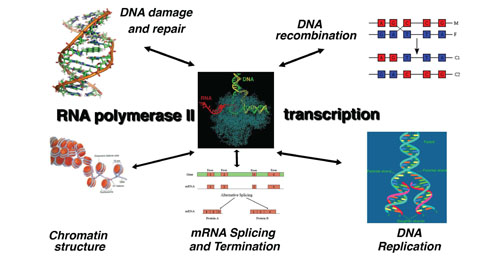Research
Gene expression is the evolutionarily conserved pathway that deciphers the coded messages in our DNA. It is essential for growth and viability, and allows cells to respond to differentiation cues, stimuli, and insults.
Decoding of our DNA occurs via two distinct processes, transcription and translation. We study these processes and how they are regulated, both at the molecular, cellular and organismal level. Despite decades of progress, many aspects of these processes thus remain incompletely understood, and CGEN is uniquely positioned to address the knowledge gaps through innovative, interdisciplinary research. CGEN thus has expertise ranging from DNA and chromosome structure, RNA polymerase II transcription, mRNA processing, and the mechanisms governing mRNA translation. While these processes have increasingly developed into fields of research that are largely isolated from each other, an important aim of CGEN is to investigate the process of gene expression in its entirety, through collaboration and efficient knowledge dissemination in a closely knit research center. To reach our ambitious goals, we use an unusually wide-ranging suite of state-of-the-art techniques, including mouse genetics, high-resolution imaging, genome-wide analysis, molecular cell biology, proteomics, genomic screening using haploid human cells, and reconstitution biochemistry.
The leaders of the individual CGEN research groups are listed below, each accompanied by a brief summary of their scientific focus and a link to their respective group pages
Svejstrup Group study the interface between transcription and other DNA-related processes, such as DNA repair, replication, and recombination.
One of the hallmarks of human disease, including cancer, is the deregulation of gene expression: genes that are supposed to be inactive become activated, or vice versa. Another characteristic of cancer cells is their unstable genomes. They are unable to repair or maintain the integrity of their DNA.
Over the last decade, it has also become increasingly clear that the process of transcription itself entails a significant risk for genome stability. The mechanisms that ensure the safe co-existence of transcription with DNA replication and pathways maintaining genome integrity are still poorly understood.
We seek to understand transcription and the maintenance of genome integrity using a unique combination of biochemical, genetic and cell biological techniques, primarily in human cells.
Homepage for Svejstrup Group
(Department of Cellular and Molecular Medicine)
The overarching aim for the Bekker-Jensen Group is to understand the molecular details of cellular stress responses and how they contribute to human diseases such as cancer and aging-related maladies. We are especially interested in understanding the mechanisms by which the MAP kinases p38 and JNK become activated in response to cellular stress insults such as ribosomal impairment, oxidative stress and high osmolarity, and how such signalling drives or protect against pathological cellular changes. Importantly, the same signalling pathways are crucial for inflammatory responses, adding to the relevance of our work for a range of human diseases.
Homepage for Bekker-Jensen Group
(Department of Cellular and Molecular Medicine)
Gregersen Group aim to understand fundamental biological mechanisms underlying transcriptional regulation and processing of nascent RNA in mammalian cells and how misregulation of these processes contribute to human disease such as cancer. We are especially interested in understanding how proteins interacting with the CTD of RNAPII impact co-transcriptional RNA processing events and how these processes are regulated.
Homepage for Gregersen Group
(Department of Cellular and Molecular Medicine)
also see gregersenlab.com
Haahr Group aims to identify and characterize new genes that play important roles in human disease by studying basic mechanisms of cellular stress responses and gene expression using a combination of unbiased proteome- and genome-wide screens as well as targeted molecular and cell biological approaches.
Homepage for Haahr Group
(Department of Cellular and Molecular Medicine)
We are fascinated by the intricate three-dimensional organization of the genome within the cell nucleus and investigate how essential biological processes are orchestrated within this spatial framework. Our research focuses on the organisation of 3D chromatin, with particular emphasis on the cohesin complex. We are especially interested in cohesin’s dual roles: organizing chromatin through loop extrusion to regulate gene expression, and mediating sister chromatid cohesion to ensure accurate genome inheritance.
In parallel, we explore how 3D chromatin organization contributes to the fidelity of DNA repair. We are particularly focused on the molecular mechanisms of DNA repair and its dynamic interplay with chromatin architecture. Our previous work revealed that the 3D chromatin environment surrounding a DNA lesion plays a critical role in ensuring accurate repair. Emerging evidence suggests that DNA damage not only affects the local DNA sequence but also perturbs the broader chromatin landscape, with downstream consequences for gene expression at the affected locus. Understanding how DNA repair is coordinated with other chromatin-associated processes remains a central focus of our research.
Homepage for Ochs Group
(Department of Cellular and Molecular Medicine)
The research interests of Møllegaard Group is Genome structure and organisation. DNA structure and transcription regulation.
Homepage for Møllegaard Group
(Department of Cellular and Molecular Medicine)

